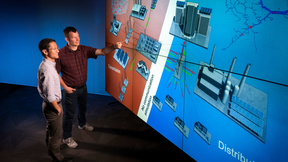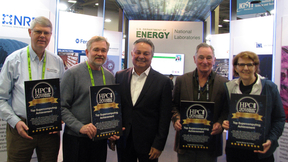Back
Computing
CECOR summer internship prepares students from HBCU for cybersecurity jobs, research
A University of the Virgin Islands graduate with a degree in computer science, Angie Estien first heard of Lawrence Livermore National Laboratory (LLNL) at a conference in Puerto Rico during her sophomore year. Intrigued by the Lab’s national security mission, she wanted to learn more. Working with her college adviser, Estien applied for a summer internship at LLNL through…
HPC4Energy Innovation Program announces first awards for public/private partnerships
The High Performance Computing for Energy Innovation program (HPC4EI) today announced the nine public/private projects awarded more than $2 million from the Department of Energy (DOE), with aims of improving energy production, enhancing or developing new material properties and reducing energy usage in manufacturing. The projects represent the first joint round of funding…
LLNL's Lassen supercomputer leaps to No. 10 on TOP500 list, Sierra remains No. 2
Lawrence Livermore National Laboratory’s Lassen joined its companion system Sierra in the top 10 of the TOP500 list of the world’s most powerful supercomputers, announced Monday at the 2019 International Supercomputing Conference (ISC19) in Frankfurt, Germany. Lassen, an unclassified, heterogenous IBM/NVIDIA system with the same architecture as Sierra but smaller, placed…
LLNL, foundation seek to set up ALS consortium
Lawrence Livermore National Laboratory (LLNL) and the Livermore Lab Foundation (LLF) are exploring the establishment of a consortium that would leverage the Lab’s computing capabilities to identify causal factors for amyotrophic lateral sclerosis (ALS), or Lou Gehrig’s disease. Under a newly signed strategic partnership project agreement, the foundation will provide funds…
Two-week workshop lets UC Merced students step into shoes of Lab computer scientists
University of California Merced student Asmaa Mohamed, who immigrated to the U.S. from Egypt in 2013, recently graduated with a bachelor’s degree in developmental biology. She plans on pursuing her Ph.D. through Dartmouth College and is studying immunology in hopes of someday creating novel cancer immunotherapies. When Mohamed found out Lawrence Livermore National…
Redesign of Cardioid's heartbeat simulation brings code one step closer to clinical use
A team of Lawrence Livermore National Laboratory (LLNL) researchers has successfully optimized a code that models the human heartbeat for next-generation, graphics processing unit (GPU)-based supercomputers, with an eye on developing it for virtual drug screening and modeling heart activity in clinical settings. Cardioid, a suite merging mathematical solvers for…
NFL comes to Lab to hear latest on TBI research
Officials from the National Football League visited Lawrence Livermore National Laboratory (LLNL) recently to hear how the Department of Energy’s (DOE) national laboratories are using high-performance computing and artificial intelligence to advance scientific understanding of traumatic brain injury (TBI). San Francisco 49ers chairman John York and NFL Executive Vice…
New call for HPC4EnergyInnovation proposals
The Department of Energy (DOE) and Lawrence Livermore National Laboratory (LLNL) today announced the spring 2019 call for proposals for the High Performance Computing for Energy Innovation (HPC4EI) Program, including three of its pillar programs. Managed by LLNL in partnership with other national laboratories, the HPC4EI program aims to provide industry with HPC expertise…
Multi-institutional meeting centers on making the 'impossible' possible in cancer research
Computer scientists, biomedical engineers, cancer biologists and bioinformaticians from eight Department of Energy (DOE) national laboratories, health-related government agencies and universities converged at Lawrence Livermore National Laboratory (LLNL) March 6-7 to discuss ongoing efforts to advance cancer research through computation, identify existing challenges and…
Making connections, career development highlight Women in Data Science regional event
For the second straight year, the HPC Innovation Center at Lawrence Livermore National Laboratory (LLNL) played host to a Women in Data Science (WiDS) regional event on March 4, drawing in dozens of attendees from LLNL, local universities and other Bay Area national laboratories. Livermore was one of more than 150 regional events held at sites across the globe in…
Computation's Lori Diachin named one of HPCwire's 'People to Watch' for 2019
The online high-performance computing news publication HPCwire has named Lawrence Livermore National Laboratory’s Lori Diachin, Computation’s deputy associate director for science and technology, as one of its "People to Watch" in 2019. The honor recognizes key figures who are likely to propel the HPC industry forward in the coming year. In 2018, Diachin took over the role…
Going deep: Lab employees get an introduction to world of machine learning, neural networks
Deep learning is one of the most popular and widely used machine learning methods due to its success with autonomous vehicles, speech recognition and image classification, to name a few emergent technologies. But what exactly is deep learning, and how can it best be applied to Lab projects? Lawrence Livermore National Lab (LLNL) employees discovered the answers during a…
Transforming the future: LLNL team explores electric grid modernization via HPC
A Lawrence Livermore National Laboratory (LLNL) team has successfully deployed a widely used power distribution grid simulation software on a high-performance computing (HPC) system, demonstrating substantial speedups and taking a key step toward creating a commercial tool that utilities could use to modernize the grid. Partnering with power management company Eaton to use…
Playing video games may help researchers find personalized medical treatment for sepsis
A deep learning approach originally designed to teach computers how to play video games better than humans could aid in developing personalized medical treatment for sepsis, a disease that causes about 300,000 deaths per year and for which there is no known cure. Lawrence Livermore National Laboratory (LLNL), in collaboration with researchers at the University of Vermont,…
DOE machines dominate record-breaking SC18
They say everything’s bigger in Texas, and the 30th anniversary of the annual International Conference of High Performance Computing, Networking, Storage and Analysis (SC18), held Nov. 11-16 in Dallas, did not disappoint. The conference, which broke records for attendees and exhibitors, saw Lawrence Livermore National Laboratory (LLNL) once again make its presence felt on…
Sierra honored with Top Supercomputing Achievement from HPCwire
The high performance computing publication HPCwire on Tuesday handed Lawrence Livermore Laboratory (LLNL) and Oak Ridge National Laboratory (ORNL) their Editors’ Choice and Readers’ Choice Awards for the Top Supercomputing Achievement of 2018, recognizing the launch of the world’s two fastest computing systems. Representatives from LLNL and ORNL accepted the awards for…
Sierra reaches higher altitudes, takes No. 2 spot on list of world's fastest supercomputers
Sierra, Lawrence Livermore National Laboratory’s (LLNL) newest supercomputer, rose to second place on the list of the world’s fastest computing systems, TOP500 List representatives announced Monday at the International Conference for High Performance Computing, Networking, Storage and Analysis conference (SC18) in Dallas. LLNL’s Sierra, an IBM/NVIDIA system developed for…
New algorithms to predict power grid impacts from hackers, earthquakes and … squirrels?
What would it take for an entire American city to lose power? What circumstances and failures in the electrical grid’s infrastructure would lead to a dramatic, long-term blackout? And what weak points could utility companies invest in to help prevent a catastrophic shutdown? A three-year project at Lawrence Livermore National Laboratory (LLNL) is attempting to answer those…
LLNL-Norway collaboration seeks improved predictive models for cancer outcomes
A group of researchers from Lawrence Livermore National Laboratory recently visited the Cancer Registry of Norway (CRN) in Oslo to discuss the progress of ongoing collaborations between the two institutions aimed at applying big data analytics to predicting cancer risk and mortality. The U.S.-Norwegian partnership began with a project headed by LLNL researcher Ghaleb…
Celebrating diversity and inclusion in tech
The annual Grace Hopper Celebration (GHC) is the premier international gathering of women in computing. This September, Lawrence Livermore National Laboratory (LLNL) sent 43 employees to GHC in Houston, Texas — the largest attendance from any national laboratory. Named after American computer scientist Grace Hopper (1906–1992), the conference packs three days of technical…
























